Fine vegetarian food is rare in Taipei, but there is artistry at work on the menu at Metro Bodhi. They have fashioned a plant-based menu that is homely yet elegant. The restaurant was started by a Buddhist organization in the belief that Buddhism does not have to be ascetic, but can be about living a full life and enjoying what it has to offer.
The restaurant is rather large with three floors for seating. It’s elegant but modestly decorated in a Buddhist fashion. Bronze statues and tea lights adorn the otherwise clean walls, creating a warm atmosphere amid plenty of literature and wines that are available for sale. The tableware is embellished with golden place settings and deep burgundy serviettes, which appear modest but still modern enough to give the restaurant a refined appeal. It resembles an upscale family restaurant.
The spicy tomato chickpea soup (NT$120) doesn’t pack much heat, but is well seasoned with herbs that give it an earthier taste than your classic tomato soup. There are three salads to choose from, my favorite being the fresh mozzarella, roasted garlic and red wine onion salad with Modena vinaigrette (NT$160 for a single serving, NT$320 for 2 to 3 people). Modena essentially means balsamic, so this salad has a dominant sweet Italian zing. If you prefer bitter flavors, try the chayote salad with grapefruit, mint olive oil dressing and aged white wine vinaigrette (NT$160 for a serving, NT$320 for 2 to 3 people). Chayote is similar to squash, but is more bland. Together, the components release a pungent yet refreshing burst of flavor on the palette.
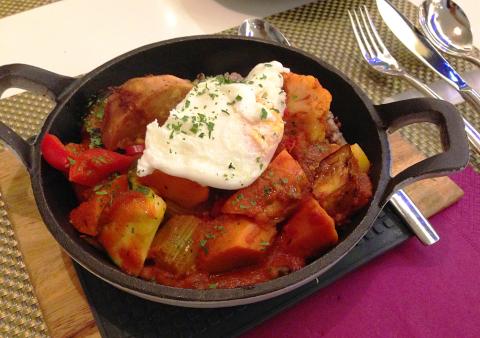
Photo by Olivia Wycech
From the appetizer menu, the goat cheese with avocado and banana dressing (NT$360) is highly recommended. It’s a small serving but worth every dollar. Diced avocado and creamy goat cheese sit atop a bed of sprouts, raisins and nuts, with a dollop of banana puree sweetened with honey, spiced with nutmeg and soured with white wine. The mushrooms with balsamic vinaigrette (NT$160) are nothing more than their description, but are sauteed until perfectly coated in a thick and not-too-sweet reduction.
The five slices of bread (NT$200) are a unique spin on a restaurant regular, as a variety of thick grains and spreads are served in a range from sweet to savory. The potato wedges (NT$100) are simple but worth ordering for the dip. A seriously strong jalapeno relish-type dip accompanies the spuds, which also comes as a side to the cumin bread sandwich (NT$280), which is topped with a poached egg and generous amounts of mozzarella cheese. The cumin was quite mild and was balanced nicely by a topping of creamed mushrooms.
The restaurant offers three sizzling pans, and both the menu and myself recommend the Ofeakwu (NT$295). In fact, it was my favorite item of the day and I immediately went home and tried to replicate this native Nigerian dish. Wild rice, various beans, seasonal vegetables and a poached egg are covered in a simple tomato sauce that makes it somewhat of a stew. The flavors are so wholesome and robust that even hardcore carnivores won’t complain.
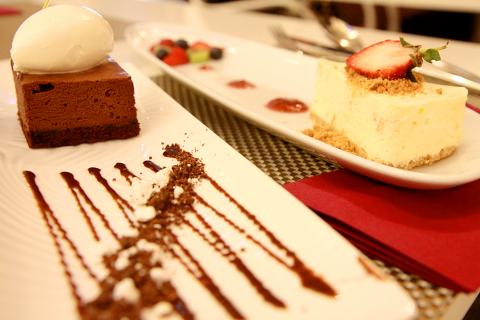
Photo by Olivia Wycech
Metro Bodhi’s interpretation of pizza is more like a flatbread with toppings, which once again gives off more of an earthier taste. The lack of oil makes it drier than what you expect from pizza, but also means you can better taste the toppings like the explosive taste of pesto on the arugula pizza (NT$300). It’s perfect for those who enjoy the concept of pizza but usually pass on an oil-drenched deep-dish style.
There are a variety of fresh juices on the menu, like the cucumber juice (NT$120) and lemon juice (NT$150), but the real gems are the teas. The brown sugar galangal tea (NT$150 per cup, NT$200 per pot) tasted like your typical sweet milk tea but with an added zest of ginger. If milk tea is too heavy for you, the lemon-yogurt tea (NT$200 per pot) is more delicate with just a touch of creaminess. And for dessert, the cheesecake (NT$180) is what drew the most oohs and aahs. It’s creamier than most cheesecakes and has subtle hints of orange in every bite.
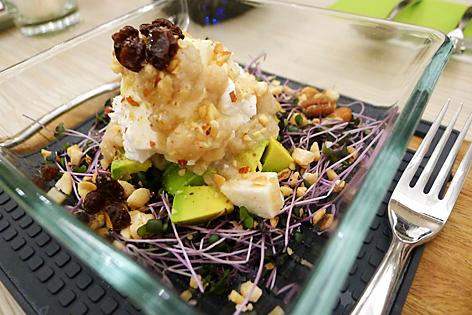
Photo by Olivia Wycech
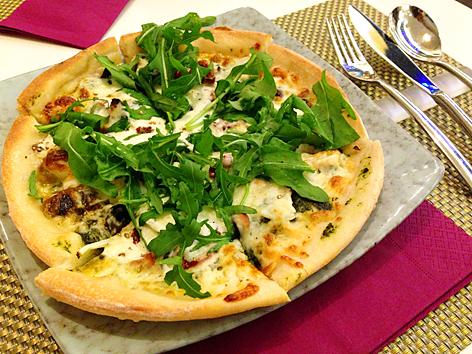
Photo by Olivia Wycech

With one week left until election day, the drama is high in the race for the Chinese Nationalist Party (KMT) chair. The race is still potentially wide open between the three frontrunners. The most accurate poll is done by Apollo Survey & Research Co (艾普羅民調公司), which was conducted a week and a half ago with two-thirds of the respondents party members, who are the only ones eligible to vote. For details on the candidates, check the Oct. 4 edition of this column, “A look at the KMT chair candidates” on page 12. The popular frontrunner was 56-year-old Cheng Li-wun (鄭麗文)

“How China Threatens to Force Taiwan Into a Total Blackout” screamed a Wall Street Journal (WSJ) headline last week, yet another of the endless clickbait examples of the energy threat via blockade that doesn’t exist. Since the headline is recycled, I will recycle the rebuttal: once industrial power demand collapses (there’s a blockade so trade is gone, remember?) “a handful of shops and factories could run for months on coal and renewables, as Ko Yun-ling (柯昀伶) and Chao Chia-wei (趙家緯) pointed out in a piece at Taiwan Insight earlier this year.” Sadly, the existence of these facts will not stop the

Oct. 13 to Oct. 19 When ordered to resign from her teaching position in June 1928 due to her husband’s anti-colonial activities, Lin Shih-hao (林氏好) refused to back down. The next day, she still showed up at Tainan Second Preschool, where she was warned that she would be fired if she didn’t comply. Lin continued to ignore the orders and was eventually let go without severance — even losing her pay for that month. Rather than despairing, she found a non-government job and even joined her husband Lu Ping-ting’s (盧丙丁) non-violent resistance and labor rights movements. When the government’s 1931 crackdown
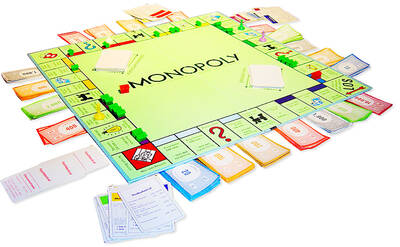
The first Monopoly set I ever owned was the one everyone had — the classic edition with Mr Monopoly on the box. I bought it as a souvenir on holiday in my 30s. Twenty-five years later, I’ve got thousands of boxes stacked away in a warehouse, four Guinness World Records and have made several TV appearances. When Guinness visited my warehouse last year, they spent a whole day counting my collection. By the end, they confirmed I had 4,379 different sets. That was the fourth time I’d broken the record. There are many variants of Monopoly, and countries and businesses are constantly